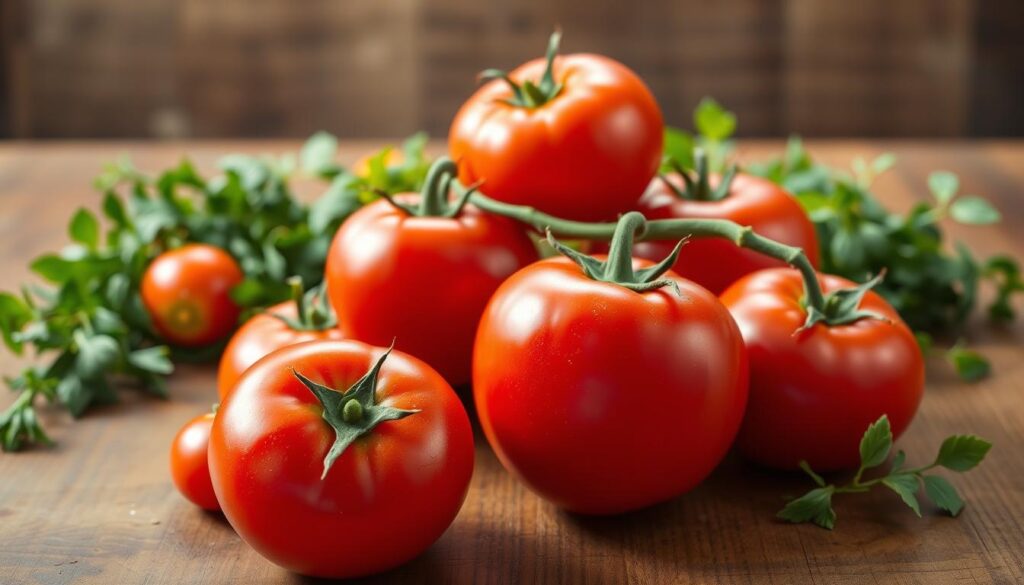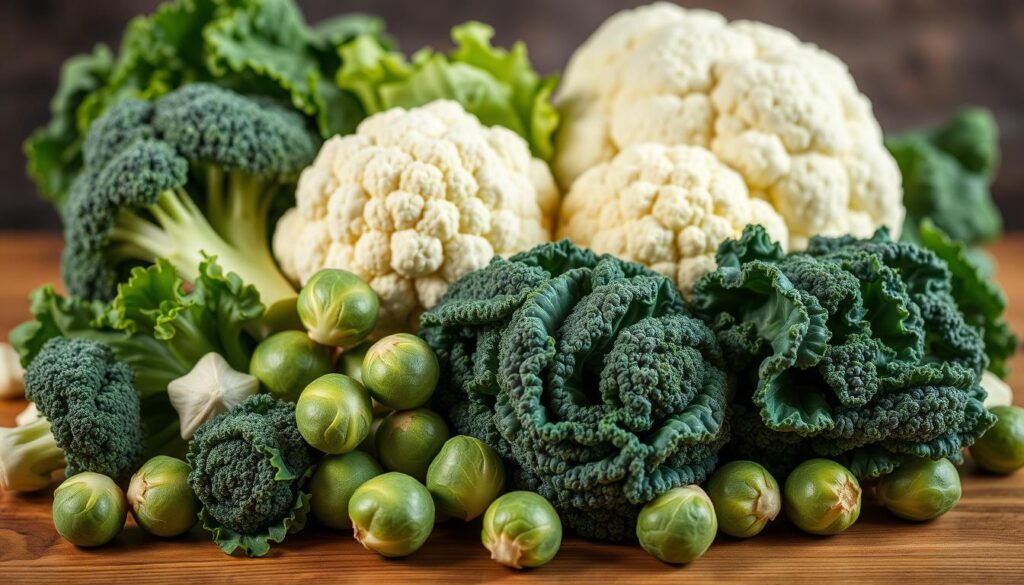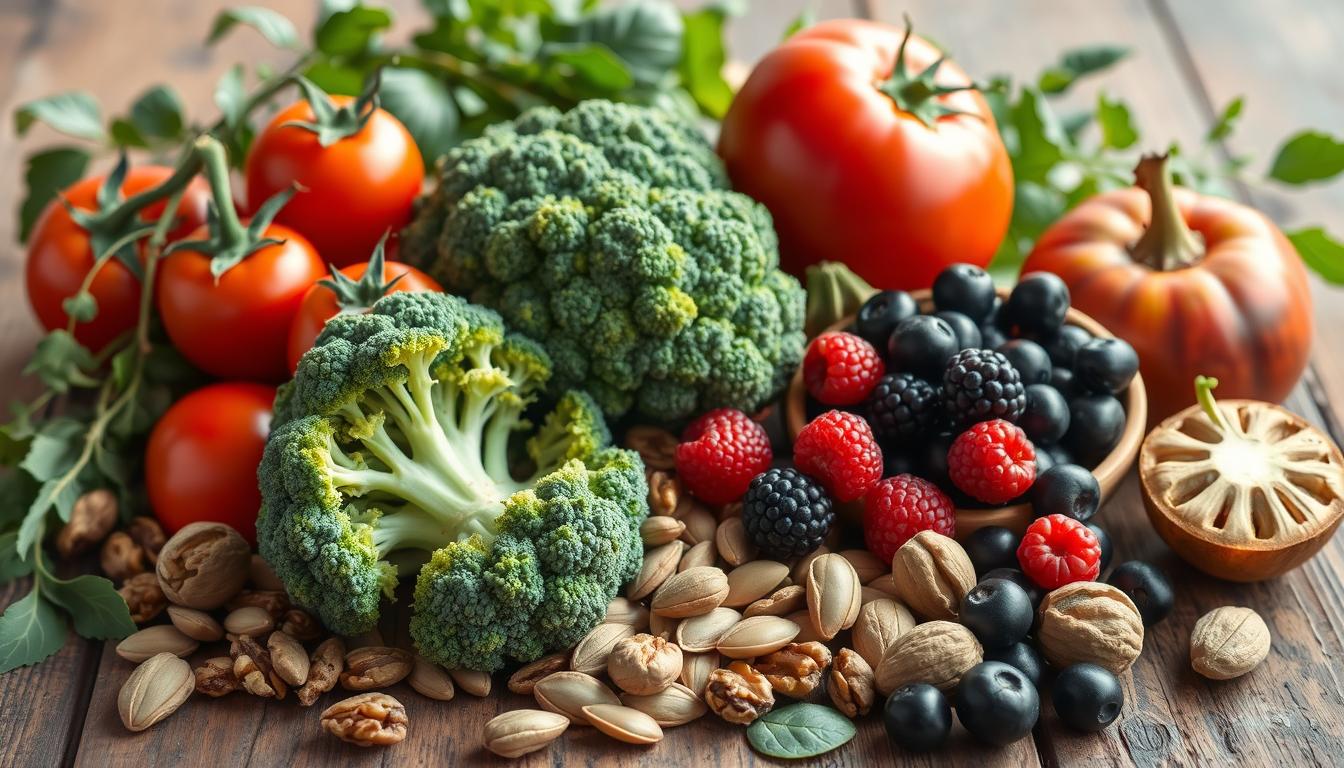Top 10 Foods for Prostate Health: Boost Wellness Now
I never thought much about my prostate until my dad was diagnosed with cancer. It hit me hard – this wasn’t just an “old man’s problem.” I dug into research, desperate to find ways to protect myself. What I discovered shocked me: our everyday food choices can make a real difference in prostate health.
Prostate cancer is the most common cancer among males in the United States, affecting 1 in 8 males1. This statistic is alarming, but there’s hope. A prostate-friendly diet rich in plant-based antioxidants and specific nutrients can be a powerful tool in prostate cancer prevention.
The Science of Living Well, Beyond Cancer recommends a diet high in colorful vegetables, low in sugar and processed carbohydrates, and moderate in animal-based protein2. This approach emphasizes the health benefits of beans, nuts, soy, and certain fish – all key players in a prostate-friendly diet.
From tomato-based foods packed with lycopene to zinc-rich options that support prostate function, the right dietary choices can make a significant impact. Let’s explore the top 10 foods that can boost your prostate health and overall wellness.
Key Takeaways
- Prostate cancer affects 1 in 8 males in the US
- A diet rich in colorful vegetables supports prostate health
- Plant-based antioxidants play a crucial role in prevention
- Reducing sugar and processed carbs is beneficial
- Specific foods like tomatoes, fish, and soy can boost prostate wellness
- Balancing animal and plant-based proteins is important
Understanding Prostate Health and Nutrition
A healthy diet is key for prostate health. Eating the right foods can greatly improve our health. Let’s look at how nutrition affects prostate wellness.
Learn More About A Powerful Urinary Flow Without Thinking Twice About Your Prostate.
Diet and Prostate Cancer Risk
Studies link diet to prostate cancer risk. Men eating 28 servings of veggies a week face lower cancer risk than those eating less than 143. Cruciferous veggies, like broccoli, can cut cancer risk by 41% if eaten three times a week3.
Key Nutrients for Prostate Wellness
Some vitamins are crucial for prostate health. Lycopene in tomatoes can lower cancer risk4. Omega-3s from fish may also protect against cancer and other serious issues4. Men with more EPA and DHA omega-3s have a 40% lower cancer risk3.
Importance of a Balanced Diet
Eating a balanced diet is essential for prostate health. Aim for 25 to 35 grams of fiber daily to possibly lower cancer risk3. It’s also important to watch calorie intake. High-calorie diets can increase cancer risk. Men eating the most calories face a nearly four-fold increase in risk compared to those eating the least3.
By following these nutritional tips, we can support our prostate health and overall well-being.
Learn More About A Powerful Urinary Flow Without Thinking Twice About Your Prostate.
Tomatoes: The Lycopene Powerhouse

Tomatoes are a nutritional powerhouse for prostate health. They are full of lycopene, a strong antioxidant. A small 100-gram raw tomato has only 18 calories and 28% of vitamin C you need daily5.
Tomatoes and prostate enlargement have an inverse relationship. Lycopene in tomatoes fights oxidative stress and may slow tumor growth. Interestingly, processed tomato products like ketchup, juice, and sauce have more lycopene than fresh tomatoes5.
Americans eat about 6.6–10.5 mg of lycopene every day. Most of it comes from processed tomato products6. This makes tomatoes a top choice for shrinking the prostate naturally. For better absorption, eat tomatoes with healthy fats, which can boost lycopene absorption up to four times5.
“Eating a variety of fruits and vegetables, including tomatoes, is key to obtaining a broad range of essential nutrients for overall health.”
Studies show that eating tomatoes regularly may lower heart disease and cancer risks, including prostate cancer5. A 2021 study in Food Chemistry found that tomatoes and lycopene can prevent prostate cancer and other health problems7.
| Product | Lycopene Content (mg/100g) |
|---|---|
| Fresh Tomatoes | 0.88–7.74 |
| Ketchup | 9.9–13.44 |
While processed tomato products are rich in lycopene, choose fresh tomatoes when you can. They have more benefits and fewer additives. Remember, eating tomatoes regularly is important for prostate health.
Learn More About A Powerful Urinary Flow Without Thinking Twice About Your Prostate.
Cruciferous Vegetables: Broccoli and Beyond

Cruciferous vegetables are full of plant-based antioxidants and help reduce inflammation. Broccoli is a top choice in this group, fighting prostate cancer well. It may lower the risk of advanced prostate cancer by nearly 50 percent8.
Sulforaphane: The cancer-fighting compound
Broccoli’s secret is sulforaphane, made when we chew or cut it. This compound fights cancer cells well. Broccoli has lots of glucosinolates, turning into sulforaphane and other antioxidants9.
Other beneficial cruciferous vegetables
While broccoli shines, other veggies are important too. Collard greens are full of antioxidants and vitamins A, C, and K9. Cauliflower, kale, and Brussels sprouts also help prostate health.
Cooking methods to maximize benefits
For the best results, steam or stir-fry these veggies lightly. This keeps nutrients and compounds that fight cancer. Don’t overcook, as it can lessen their benefits.
Eating a variety of cruciferous vegetables boosts prostate health. These antioxidants work best with a diet full of different, nutrient-rich foods.
Fatty Fish: Omega-3s for Prostate Protection
Fatty fish can greatly improve prostate health. Cold-water fish like salmon, sardines, and trout are full of omega-3 fatty acids. These fats are good for you and don’t cause inflammation like other fats do. Studies show that eating healthy fats can help the prostate stay healthy and grow slower10.
Salmon is a great choice because it’s loaded with omega-3s. These fats help fight inflammation in the body10. The amount of omega-3s in fish can vary. In Western countries, people get about 3%–5% of their fatty acids from fish. In Japan, where people eat more fish, this number is about twice as high11.
When looking at milk for prostate health, some infant formulas have DHA added since 200211. For adults, while milk isn’t full of omega-3s, eating fatty fish is good. Avoiding red meat, which has saturated fats, can also help. Eating more fish and less red meat is a smart choice for prostate health.
Eating a variety of fruits, vegetables, and healthy fats is key for prostate health10. Making these changes can help prevent prostate cancer. By doing this, you’re taking a big step towards better prostate health.
Learn More About A Powerful Urinary Flow Without Thinking Twice About Your Prostate.
FAQ
What is the best fruit for prostate health?
What kind of milk is good for prostate health?
What foods should be avoided for prostate health?
What vitamins are beneficial for prostate health?
Can foods really shrink the prostate gland?
What are good foods to eat for prostate health?
Source Links
- Prostate Health: 6 Foods to Eat – https://www.healthline.com/health/prostate-cancer/foods-for-prostate-health
- Five Foods to Protect your Prostate – https://www.pcf.org/c/five-foods-to-protect-your-prostate/
- Nutrition and Prostate Cancer – https://www.ucsfhealth.org/education/nutrition-and-prostate-cancer
- 10 Great Foods For Prostate Health – Alliance Urology – https://allianceurology.com/10-great-foods-for-prostate-health/
- Tomatoes 101: Nutrition Facts and Health Benefits – https://www.healthline.com/nutrition/foods/tomatoes
- An Update on the Health Effects of Tomato Lycopene – https://www.ncbi.nlm.nih.gov/pmc/articles/PMC3850026/
- What Makes Tomatoes The Healthiest Fruit In The World, According To Experts – https://www.delish.com/food-news/a44869072/healthiest-fruit-tomatoes/
- 5 Foods for Prostate Health – Urologist | UC Irvine Department of Urology – https://uciurology.com/blog/5-foods-for-prostate-health/
- Eat It To Beat It Challenge: 30 Foods – https://www.pcf.org/30foods/
- Enlarged prostate diet: Foods to eat and avoid – https://www.medicalnewstoday.com/articles/321079
- Office of Dietary Supplements – Omega-3 Fatty Acids – https://ods.od.nih.gov/factsheets/Omega3FattyAcids-HealthProfessional/

